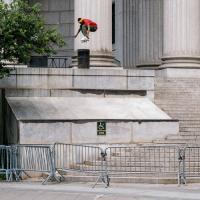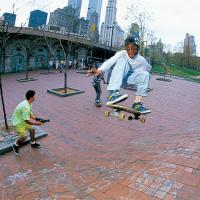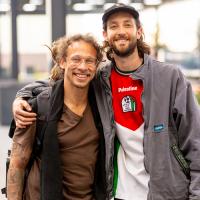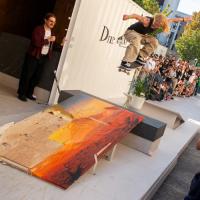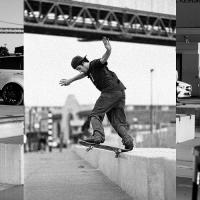Jake Johnson: The GX Interview
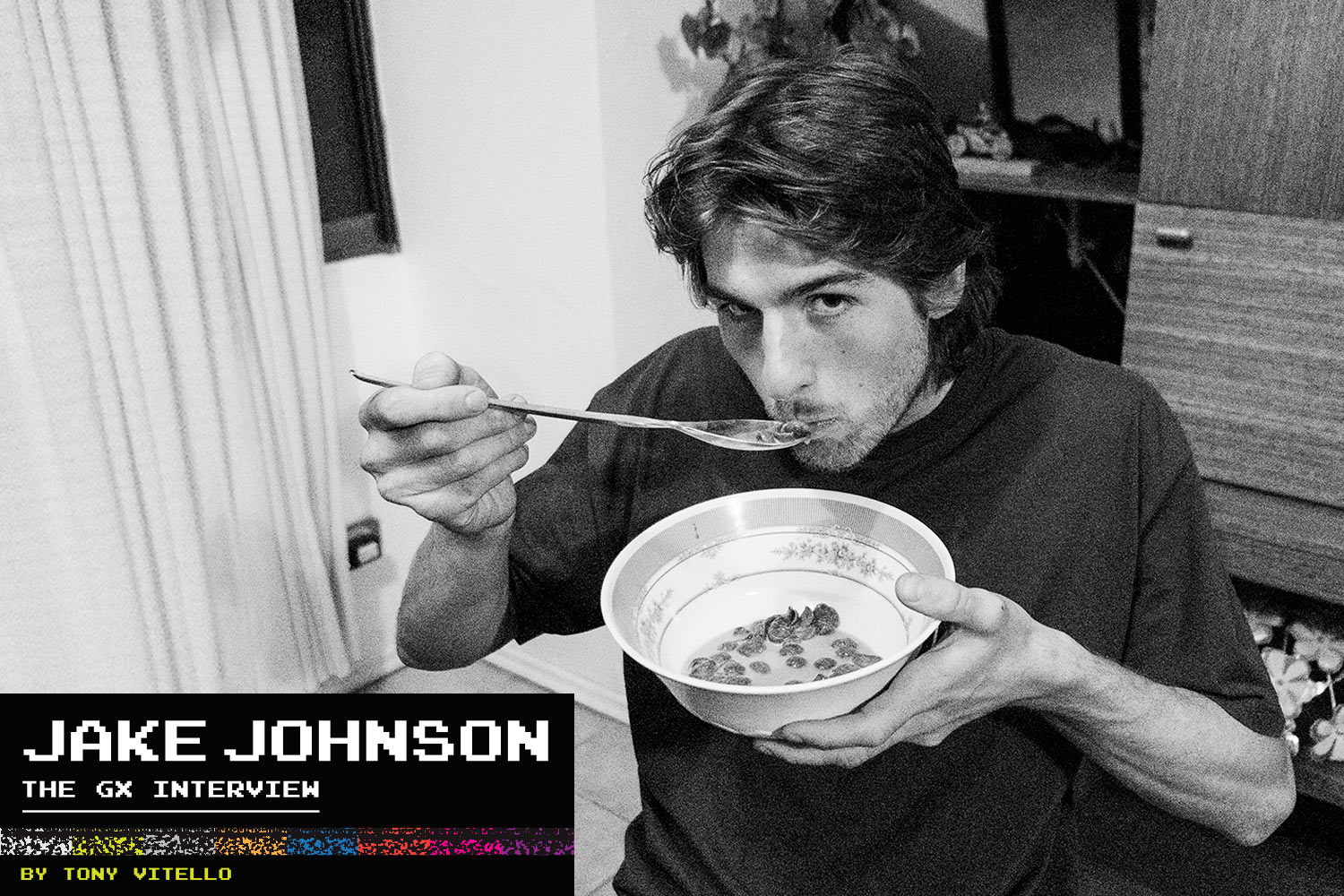
Photo: Hart
How did you and Ryan Garshell meet?
We have a mutual friend named Brengar. He worked on Mindfield, filmed Gonz and was in some things that Bill Strobeck made. This was before the rise of the Internet clip. I think Bill had a lot to do with the rise of the Internet clip. He made these single clips that were powerful. Brengar was his little protégé, though little doesn’t really describe him well. He’s a big guy. He and I were supposed to go on a post Mindfield filming trip to Florida, but I sprained my ankle really bad in January of 2009, right after the video came out. Brengar ended up going down there anyway and stayed on Fred Gall’s couch. That’s where he met Garshell. They’re both filmers and they became friends. Fast forward two years and the next time I’m in Miami, Brengar tells me I should really go out filming with his friend Ryan Garshell.
Is filming with Ryan different than with other people?
Yeah, when I first met him in Miami I was down there to see a rocket launch at Cape Canaveral. I was with my ex and wasn’t even really there to skate, since I was recovering from a torn PCL. But I ended up sticking around Florida, and we started going out filming and he was just really patient and positive, which was big for me because I didn’t have a lot of confidence, having not skated for months. It just felt natural with Ryan; he was comfortable with whatever happened. It was a rebirth for me. I was happy to be skating again and able to film with someone who didn’t mind me taking hours to make a single line happen. He also really had an enthusiasm for finding spots and being out all day. We really became close when I came to visit SF and he was staying out here. At the time I was already having issues with Workshop. They wanted everyone to film in HD and I didn’t want to.  Nollie 180 in the LES. NYC, NY Photo: Mehring
Nollie 180 in the LES. NYC, NY Photo: Mehring
Okay, so while we’re on the topic of HD versus VX, tell me if it’s more of an aesthetic thing or does HD add more pressure? What’s the deal?
At that time it was just an ethical thing for me. I didn’t believe that footage needed to be in HD. Like, why is this a rule? You should be able to film however you want. Nowadays, that is more accepted; you can film on an iPhone if you want, but a few years ago when HD was transitioning into skating, it was HD or nothing with some companies. And Workshop was saying it had to be like that. The way I look at it, we shouldn’t be doing things because somebody tells us that’s the way it has to be. We should just create the media on whatever medium, however we want, and people can feel however they want about it. We shouldn’t be followers. I mean, when Alien made Memory Screen, it didn’t make sense to a lot of people at first, but they eventually caught on to what Workshop was doing. So, basically, I just wanted to do things the way I wanted to do it. Plus, I think my footage looks better with the VX. I still don’t like seeing certain skating in HD. It’s my own aesthetic opinion, but I feel it looks video game-ish. At the end of the day, as a skater, you’ve come all this way doing things the way you want to do it, probably rebelling against whatever your parents thought was best for you, not going to school, not caring about anything other than skating. Then you become a pro and someone tries to get you to do what you’re told. It goes against everything that got you to this point in the first place.
So how do you reconcile making money in skating, having it become a job and just skating itself? There are a lot of pros jumping ship to do their own thing right now. How much of this is about money and how much is about just having control and being able to do whatever you want? Money and skateboarding can get awkward.
It’s a strange thing and I struggle with it all the time. I think a lot of skateboarders have—like, they weren’t able to blend the concepts of skating for love and skating as a job together.  Banked nose manual. Photo: Hart
Banked nose manual. Photo: Hart
How do you balance that?
There’s a thousand different ways I do, but it doesn’t always work. I fall in and out of love with skateboarding. And it’s typically because of injuries. I never had those thoughts until I really started getting injured. Then you start distrusting yourself, your body, and you start asking yourself if this is really something you should be doing for a living. Am I gonna be bitter if I don’t skate hard enough or bitter if I end up skating too hard and I’m hurt, you know? I know for sure that right now I’m preparing for serious issues with arthritis and my lower back for my whole life. Could I have avoided that? Yes. Would it have been worth it? No.
On a typical day, after you come home from skating, what hurts consistently?
I have plantar fasciitis, which is fluid build up in my heels, which is basically like a heel bruise all the time. I’ve had that since I was 17 and it’s never gone away, so any time I jump down something or even land hard on flatground I get these huge heel bruises. My back, too. I slipped a disc in my back here in SF jumping a bump to bar. Basically your back bone is like bushings and when they blow out your spine slides, and if it’s at the bottom of the spine the whole spine slides with it. And both of my knees are fucked up from the PCL tear and a motorcycle accident. I end up doing a lot of stretching and lightweight training to try and counterbalance these things. Skateboarding is constantly knocking your body out of alignment. I’m willing to give this thing a couple more years because I love it.
It’s that bad?
You know what’s fucked up? I think I really messed my body up jumping down stuff when I was younger and my body was still growing. If I could give advice I’d say don’t jump down stuff until you’re older. That’s something that was really lost on our generation. There was such an emphasis on stair counting, and it was so cool because of what Reynolds and Lenoce and all those guys were doing. So everyone in our generation was, like, “We gotta do it; we gotta do it.”
I can see the height thing being an issue. There are basketball players whose careers never even start because their bodies continually have issues as a direct result of height.
Wouldn’t that be the worst feeling ever: to just sit on the bench getting money and not be able to play? People probably think they’re hyped just collecting a check, but I know I feel terrible when I’m hurt and feel like I’m not contributing anything.  Switch wallride. Photo: Zaslavsky
Switch wallride. Photo: Zaslavsky
Okay, going back to the topic of your feet. Ryan told me about your talents in Dance Dance Revolution. He said you attribute some of your skateboarding prowess to skills you developed playing that game. It made me laugh at first, but maybe there’s some validity.
My older brother got really into the game in high school. Long story short, at the Johnson family household in State College, Pennsylvania, we had high-level dance pads in the garage and we played a lot. For three or four months I got really into it and kinda became an expert. It’s basically like jumping rope. At that time I was going through a big growth spurt. I shot up, like, eight inches, and it felt like one day all of a sudden I could just jump higher, like, I could dunk a basketball. So I would joke that it was Dance Dance Revolution that made me jump high. So I
kept playing it, like, nonstop…
Obsessively?
Not like an obsession, but when you’re a kid in a small town and don’t really have anyone to skate with you might pick up some strange hobbies. Plus, I was looking for any possible way to hang out with my older brothers. They wouldn’t let me skate with them, so this was like a bonding thing.
Do you remember your first wallie or wallride?
I don’t remember my first wallie, but I definitely remember the first wallride because it took me, like, four months to learn. It was on a brick wall with an overhang where we’d skate when it rained. There wasn’t a ton of space there, so after I did all my flip tricks I’d try to figure out wallrides. I remember for a while thinking that even when I landed them I wasn’t doing them right. 
I ask because, one: you’re really good at them, and two: there’s something about slamming into a wall that feels better than any other trick.
Yeah, for sure. I also think it has something to do with the balance and way you approach the trick. I remember when I was trying to learn them I couldn’t understand how you popped off the tail even though your nose hits the wall first. It forced me to think more about putting my weight into my front truck.
I think most street skaters are used to keeping their weight on their back truck. Wallies and wallrides opened up this whole new world for me where I would put all my weight into my front truck even though I was doing a regular-stance trick. And now, while I’m learning how to skate transition I realize that it’s all about transferring my weight from front to back, front to back, without jumping.
Do you get obsessive about tricks? Like, maybe no-complies?
I think it’s more out of necessity and surprising myself. That’s what really drives me. When I first moved to New York I didn’t want to be that basketball player sitting on the bench. I needed to change the way I skated out of necessity. I didn’t even wallie anything until I moved to New York and saw Eastern Exposure. I’m sure I’d seen the trick done before, but it didn’t click until then. I remember really liking that feeling of surprise in New York. You might be having a tough day, things aren’t going your way, but then you get to a spot and something clicks. You see it in a different way. The spots there were challenging, but once you unlocked that state of mind where you were able to skate it, that’s an amazing feeling. As far as no-complies, that was a necessity thing, too. I first saw Terps do it, and it was a trick that I couldn’t do, and I just knew right then that I couldn’t go on any longer not knowing what that trick felt like. The way I do tricks, it takes a lot of time for me to develop them. I try to do them as good as I possibly can. I watch other people do them and study the technique. I’ve always done that.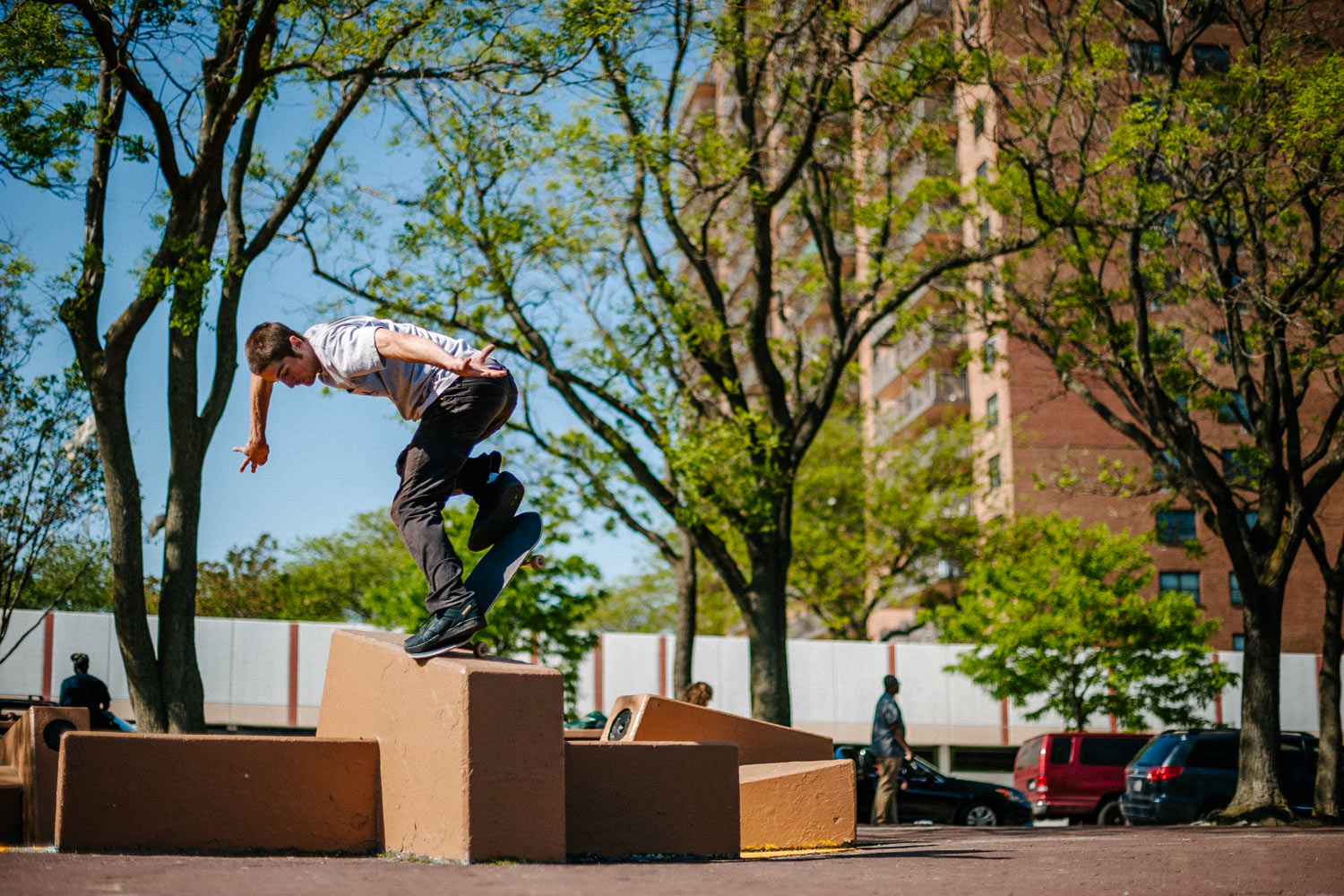 Wallie backside noseblunt slide. Photo: Mehring
Wallie backside noseblunt slide. Photo: Mehring
You’re a student of skateboarding.
Yeah, I always have been. When I was a little kid I’d watch videos in slow motion just to analyze the foot placement. I would think that if I could just watch everything in slow mo and study exactly where they put their feet I could learn how to do the trick, too.
Do you consciously think about other video parts you’ve filmed when you’re working on a new project?
I definitely think about it when I’m trying a similar trick or skating a similar spot, but only so that I can use that experience to help me with the trick I’m currently trying. Like, is there something I can remember from the last experience that will help me land it?
I don’t really think of my parts and say, I have a backside flip already and a back tail, at least not consciously. I just want to have a well-rounded part. I definitely go in certain directions with my skating and kinda just push in that direction to see where it takes me, to see if it fits. If you plan your part out and have specific tricks in mind at specific spots you’re missing out on a lot of what’s great about skating. You won’t recognize a trick that you could do at a spot because you’re so locked in on something else. You lose the spontaneity. Filming for me is something I have to practice. It’s a lot different than skating on your own or just messing around. Tying back into Ryan, it’s important to have a filmer that you’re comfortable with, a crew that you’re friends with. Going back to what we talked about with HD, it’s like a company telling you to go out with a filmer you don’t know really well or skate with certain people you don’t vibe with. It doesn’t work like that for me.  Frontside noseslide over the ledge. Photo: Sherbert
Frontside noseslide over the ledge. Photo: Sherbert
So what should be expected of you as a pro?
Yeah, it’s not just about the small details like having to film with someone you don’t know. It’s really about, what should skaters be asked to do for their job? Should we be left alone, should we be able to sit on the bench if we want or should we be pushed out of the industry if we don’t do what the industry wants us to do? There’s a war going on in skating, just as in every aspect of society. Nobody wants to give up power; everybody wants to be in control.
Do you feel like with Quasi you’re more in control? Like you’ve found a side and it feels way less industry than Workshop or other companies out there.
The good thing about Quasi is it comes from a very personal relationship. Chad Bowers has known me for nine years; he knows who I am. He is willing to work with me in every way. He signed up for that. So if I wanna disappear for two months and not say a word he’ll understand and he can work around that. I just need one relationship like that in skating, with my board sponsor, where I don’t have to be accountable.
It’s really just about expectations: sponsors have expectations for their riders and sometimes they don’t really take into account how that skater operates. It sounds like Chad accepts that he’ll get from you whatever you give him and he’s okay with that. He’s not saying you need three ads and three commercials a year. And enter all the contests!
I usually base my decisions on friendships, for better or worse. At least with Chad, there’s less grey area since he knows me so well. I feel more comfortable, and I knew with Quasi it wouldn’t just be about sending him photos for ads. I was gonna have the opportunity to communicate ideas. We really want it to work, but we know in the beginning it’s tooth and nails, not a lot of budget. But it’s nice to know that it’s a small group of us putting in the work, and if we work hard we can make something that stays around for a while. 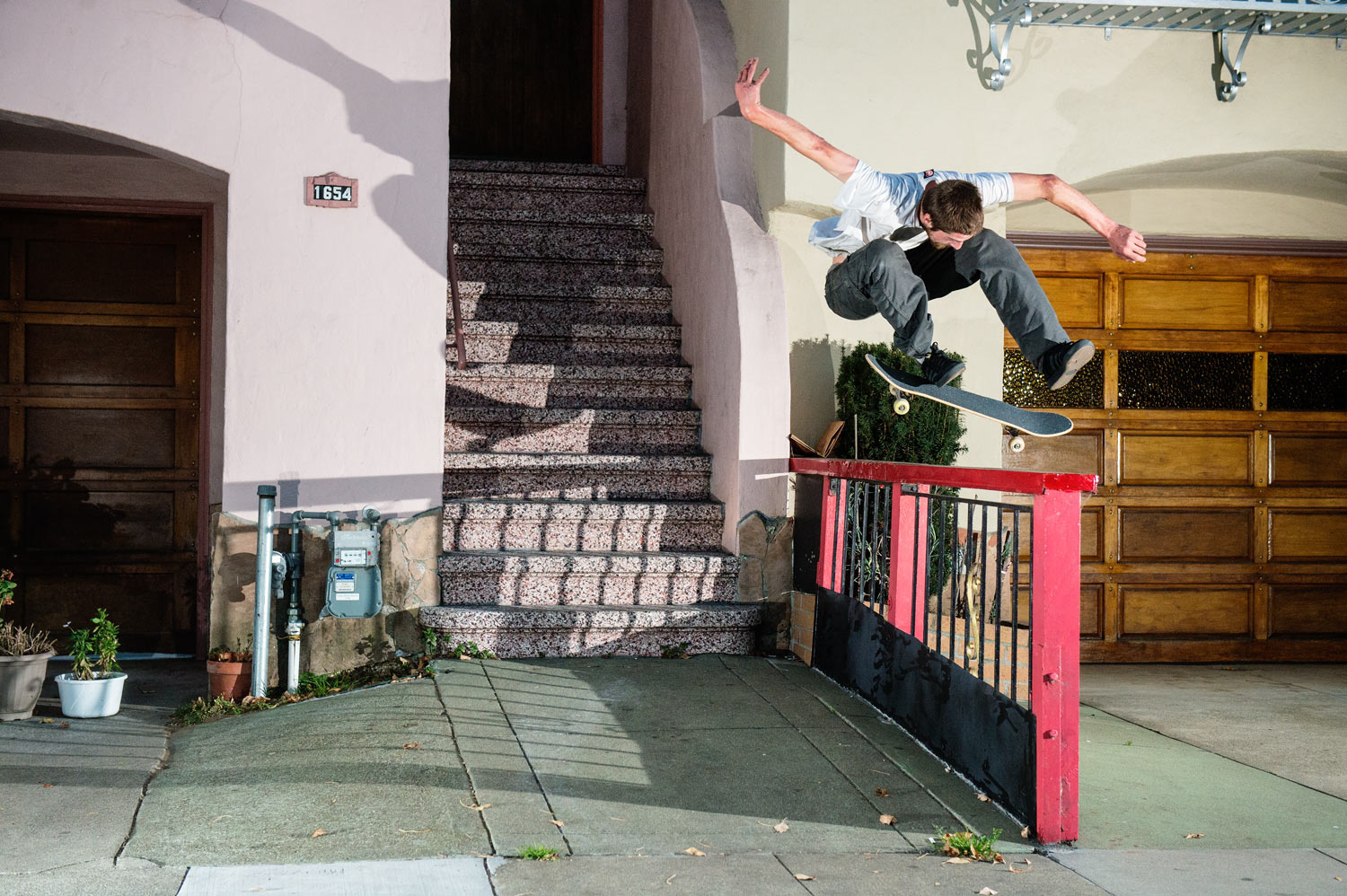 Heelfip. Photo: Zaslavsky
Heelfip. Photo: Zaslavsky
It kinda mirrors skateboarding: it’s tooth and nail. Who knows if what I’m trying is gonna work…
And it’s a lot of work. You look back at Enjoi and there was a time when Marc Johnson was doing everything. He was in charge of the look and direction of the company and at the same time had to skate at a high level. I feel like he probably got pretty burnt out on that and that’s why he quit and went to Chocolate. So for me it’s finding a balance. I don’t want to have regrets that I spent too much time working on the company and didn’t focus on skating, but I’m also at a point where I physically can’t skate every day and it’s good for me to have something else.
So a lot of it has to do with where you’re at in your skate career now. It’s an exciting time in skating with all the new companies. I think it’s great. Skateboarding is a naturally DIY experience. But at the same time I’ve told some younger skaters to just go ride for somebody else instead of trying to start their own thing. Like, you’re young. Just focus on skating and see how far you can take that. You don’t want to overburden yourself with business responsibilities right now. Save that for later.
If what’s happening in the industry now happened right before Mindfield came out and things with Dyrdek and Alien were a major problem then, I don’t think I would have known what to do. I was still taking cues from the older guys leading the way.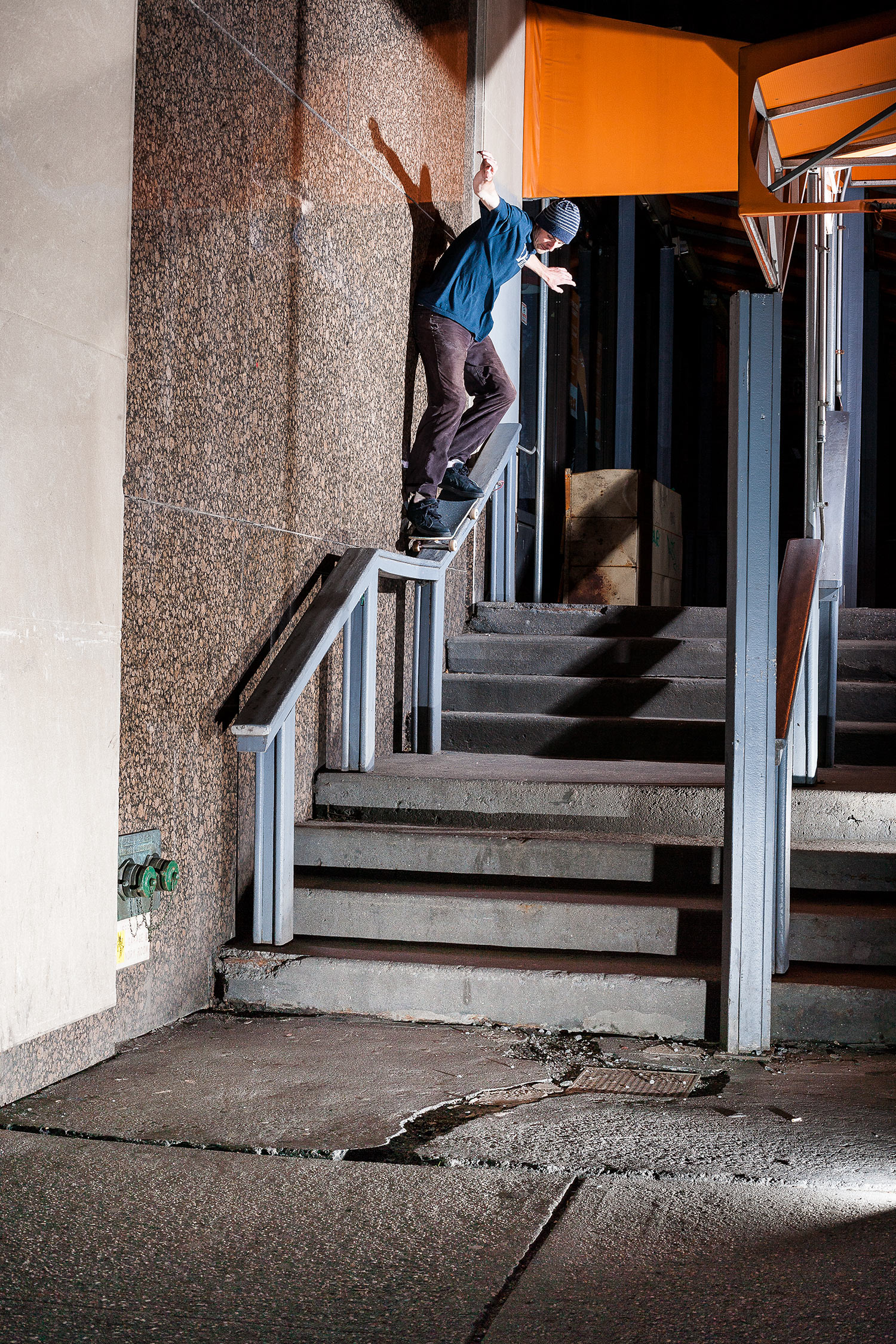 Switch backside 50-50. Photo: Sherbert
Switch backside 50-50. Photo: Sherbert
I think that the very public fallout of Alien is playing a big part in what we’re seeing right now with lots of people jumping ship and starting their own things or joining smaller companies. It was just a classic example of something getting too big, too corporate and losing its way. It was a big break up and everyone paying at least a bit of attention to skating heard about it in some capacity. But it kinda galvanized pro skaters to say, “Let’s control our own destiny. Let’s not let something we’re a big part of get sold down the river.”
Yeah, I think you’re right. Unfortunately, people immediately forget how long Alien was great—20-plus years of being at the top. Nothing lasts forever. I’m excited about all the changes in the skating industry right now, but what I’m really looking forward to is seeing what lasts and what doesn’t. Who will be able to adapt? It’s like skating: most of us have to adapt our skating as we get older and more experienced, and it’ll be the same with these companies. Who can adapt as time goes by? Who can grow from being a small brand to a mid-size company? This is kinda off topic, but with video parts, we reduce a skater’s life into three minutes. That three minutes was their life for the last year or so, but it gets reduced into just a few minutes. However, as skaters, it’s almost like we can look at those three minutes and know about that person’s life. It’s our instinct. You can hear them begging a security guard for one more try in their part and that small snippet tells you so much about them. Style, lifestyle, skate style, they all relate. People have said this before, but Neil Blender looks cool walking to the fridge to get a glass of milk. Style is so much more than just how you look on a skateboard. 
Okay, ten years from now, where is Jake Johnson?
I would really like to be an inventor. Maybe coming up with some of those as-seen-on-TV things, probably living in a mobile home. Who knows, I could have a family, too. I just wanna be happy and skating vert.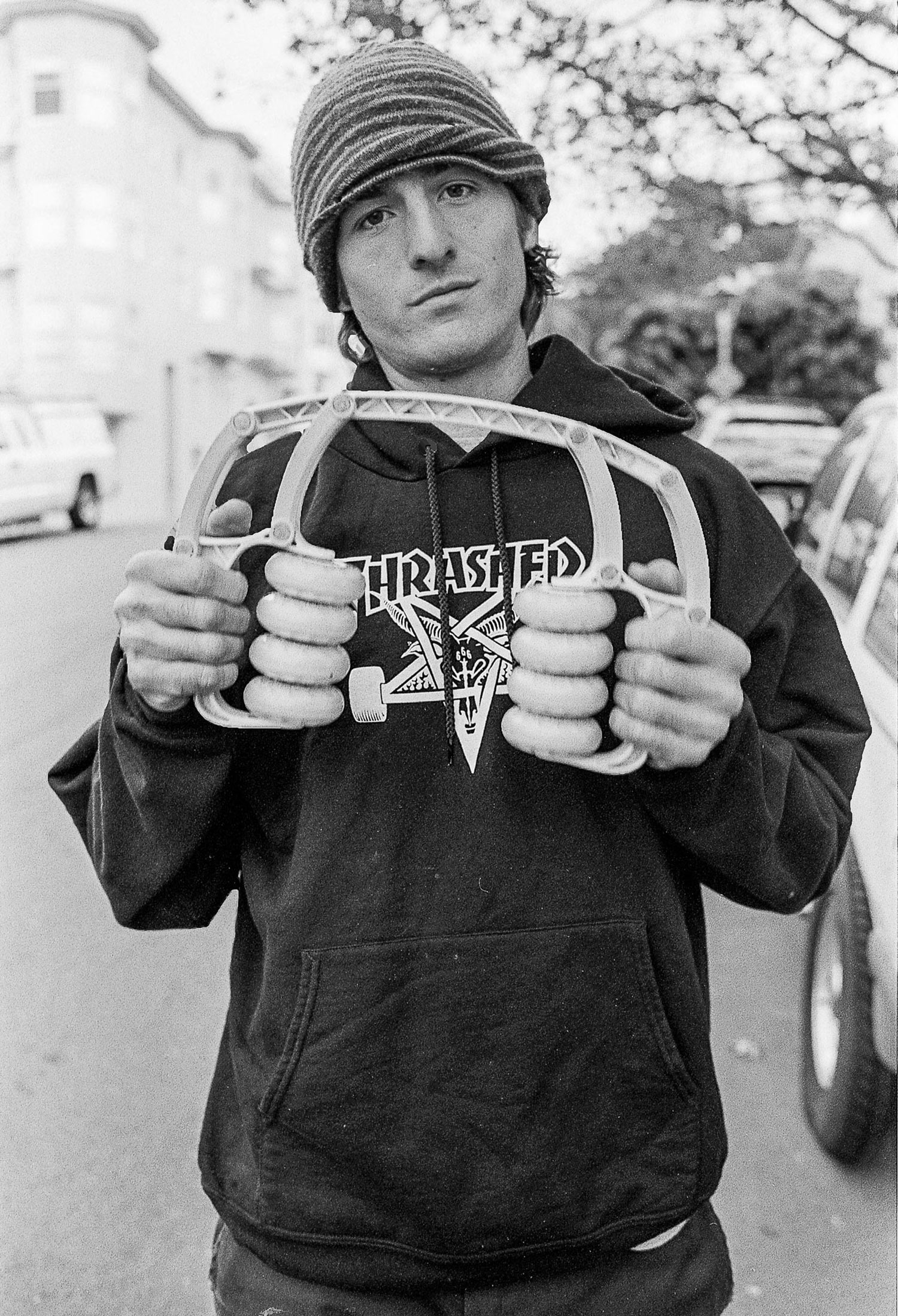 Photo: Brook
Photo: Brook
-
3/13/2024
This Old Ledge: New York Courthouse
New York City is a treasure trove of Epic Spots and rich layers of history. Ted Barrow takes us through three blocks that boast some of the best terrain in the world. Monumental spots make great skateboarding. -
3/06/2024
This Old Ledge: Brooklyn Banks
Few plazas loom as large as The Banks. From the Bones Brigade to Harold Hunter, the sessions that sparked these clips are seared into our minds. Ted Barrow's back to highlight its significance. -
2/23/2024
Slow Impact 2024 Photo Recap
Ryan Lay's second annual Slow Impact event brought visionary thinkers and low-profile dinkers down to Tempe, AZ, for a long weekend. Join in as we check the talks and architecture walks with Ted Barrow, Neen Williams, Ronnie Kessner and the New Balance crew. -
10/04/2023
Vans X Dime Party in Paris Photos
Dime and Vans linked up in the City of Love to drop a new shoe and shock the fashion-week crowds. Parisian photographer Thibault Le Nours reports on all the excitement. -
7/26/2023
This Old Ledge: Bay Blocks
Though “The Ribbon” was a doomed project for city government, the stretch of concrete blocks along the Embarcadero further cemented San Francisco’s mecca status in the ’90s and beyond.
